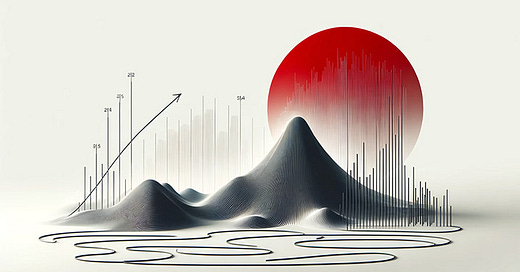Japanese Reforms Slowly Kicking In
"Investors in Japan had it easy. They could buy net-nets at under 8 P/E with 20+ years of profitability. Of course they’re going to make outsized returns" -Future Value Investors
While Japanese stocks have had a banner 2023 and are off to a good start in 2024, the opportunity in Japan remains compelling. Especially in the dirt cheap small cap space. You can still buy net-nets with 20 years of net income profitability for under 9x earnings, Nichia Steel (TYO 5658) remains a double net-net, and even non net-nets like Nissin (TYO 9066) which announced a big buyback (18% of outstanding shares) trade at 0.6 p/tbv and under 8 P/E. Nissin is also a logistics company, which means its real estate assets are likely undervalued at book.
One major criticism of my investment thesis in Japan is that companies will simply ignore the new Tokyo Stock Exchange rules about improving corporate governance, but despite a slow uptake, it’s clear that companies are following through with reforms. On January 14th, the exchange published a list of companies taking action. This list will be updated monthly and companies not on the list will face investor criticism and social pressure. Of the names on the list, the smallest cap companies, which also trade at the biggest discounts, had the least compliance. This is an ongoing process though and more and more companies are complying. The list also gives investors ammunition to ask management “why aren’t you on this list?”. It's harder for Japanese management teams to ignore exchange rules and regulations than upset shareholders.
After the list was published Onamba Co (TYO 5816), which I own, announced “Action to Implement Management That is Conscious of Cost of Capital and Stock Price.” I put that in quotes because those are the magic words that the Tokyo Stock Exchange is looking for. The company acknowledged that their RoE has not exceeding their cost of capital and going forward will 1) utilize some of their massive cash horde on growth initiatives that exceed their cost of capital, 2) increase their dividend payout ratio to 30% (which from their closing price the day before would put the yield at 7.5%), 3) aim to reach 10% RoE by 2026, and lastly 4) consider repurchasing shares. Onamba is a micro cap and was not on the Tokyo Stock Exchange list of companies complying, but after this announcement it will be. I suspect more every month we’ll see more names on that list.
The market loved the announcement, sending shares limit up 2 days in a row for a gain of ~40%.
Despite the rise, Onamba remains dirt cheap at ~0.7x P/TBV and a P/E of ~7.3. After the surge, they aren’t quite a net-net anymore, but market cap sits at $102m and netting out current assets after all liabilities values the business at just $9m. $9m for a business that will net $20m this year is cheap and I continue to own it.
Most people critical of the improved RoE / corporate governance story in Japan aren’t actually bearish. They just think they can earn more elsewhere. Japan also historically has had dirt cheap names stay cheap for such a long time that most people simply stopped looking. While returns outside Japan could be higher for astute investors, the risk-reward in Japan is incredible (especially with the sub 1% margin rates).
Critics will also point to a few management buyouts done at mere 30% premiums to absurdly cheap trading prices, which obviously isn't’ close to fair value. This is a fair point, but I think we’re in a sweet spot right now for management teams to take their companies private at cheap valuations. Rival bidders in take-privates are emerging, which ends up rewarding shareholders.
I’m also not a greedy person. I’ll gladly sell my shares in Nichia Steel at a price that values the entire business for free. After all, a valuation of $0 after net current assets and investment securities would be a double from here. A win-win!
Investors often complain on X that value investors decades ago had it easy. Warren Buffet had the opportunity to buy net-nets and cheap companies on U.S. exchanges which simply don’t exist anymore. While I agree that there are no good net-nets in the U.S., I think the current opportunity in Japan will go down in history as such a ‘duh’ moment. They’ll say “Investors in Japan had it easy. They could buy net-nets at under 8 P/E with 20+ years of profitability. Of course they’re going to make outsized returns!”
Disclosure: I own shares in all of the stocks mentioned in this article. None of this is investment advice. Everything in this post is my own opinion and I could be wrong. Do your own due dilligence.






Since the list was published by the TSE, many of my names have absolutely flown.
The #1 performer is now Terasaki Electric (6637) which went up from 1,779 to 2,420 and is now up 94.5% since my purchase.
Sanyo (5958) is up from 2,669 to 3,495
Kinki Sharyo (7122) is up from 1,748 to 2,271
Yamada Corp (6392) is up from 4,111 to 5,490
Fuji Sangyo (9906) is up from 2,389 to 2,678
#s are since my last post.
Other names have increased as well, but many remain cheap.
Altay, you've been remarkably consistent in your perspective on undervalued Japanese equities, and I've thoroughly enjoyed following along. Regulatory changes causing real actions have caused me to step back and consider that I might actually have to reevaluate being on the sidelines and establish a basket of such names. Looking forward to your future updates.